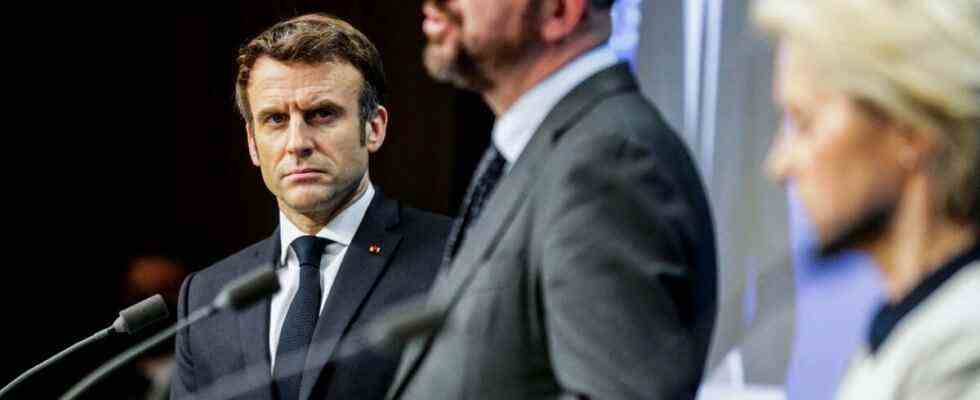After United Statesthe leaders of the European Union meeting in summit, Thursday evening, have tightened sanctions against Russia after a first round of measures. “Russian leaders will face unprecedented isolation,” said Commission President Ursula von der Leyen. And Josep Borell, the head of EU diplomacy to add: “This is the toughest set of sanctions ever implemented”.
“I am not sure that President Putin has taken the measure of the extent of the sanctions decided. It is a question of asphyxiating the functioning of Russia ”, reacted this Friday morning Jean-Yves Le Drian on France Inter. “The package of measures announced is quite spectacular. It corresponds to the gravity of the situation”, continued the Minister of Foreign Affairs.
- Prohibit new debts
Concretely, the European Union will in particular drastically limit Russia’s access to European capital markets, hindering and increasing the cost of financing its debt. In other words, in a coordinated move, the United States and Europe have decided to prohibit Russia from raising new debt in any currency in their markets.
“We are putting in place sanctions on Russian sovereign debt. The government can no longer raise money in the West, nor can it swap its debt in Europe,” US President Joe Biden had already declared on Tuesday evening. European sanctions “will drive up inflation, accelerate capital outflows and gradually erode the industrial base” of the country, wants to believe Ursula von der Leyen.
The idea behind this debt sanction is to financially asphyxiate Russia and permanently deprive it of foreign resources. The EU “wants to cut all ties between Russia and the global financial system”, explained the Minister of the Economy, Bruno Le Maire, this Friday morning. “We want to isolate Russia financially (…) We want to dry up the financing” of the Russian economy, he declared to the press shortly before the start of a meeting of finance ministers in Paris.
If the result can weigh on the value of the rouble in the short term, and by snowball effect on the purchasing power of Russian consumers, especially for imported products, Russia can also very well turn and connect with other partners like China to find funding. Moreover, Russia has a veritable fortune with a foreign exchange reserve estimated at nearly 560 billion euros and a sovereign wealth fund of around 160 billion euros. A woolen stocking which should enable him to cushion the shock of the sanctions for a certain time.
- End of exports of “crucial technologies”
The European Union has also decided to reduce Russia’s access to “crucial technologies”, depriving it of electronic components and software, so as to “severely penalize” its economy, added Ursula von der Leyen, this Thursday evening. This concerns in particular the ban on the export to Russia of aircraft, parts and equipment of the aeronautical and space industry, as well as refining technologies for the oil industry. These restrictions will also affect dual-use goods (civilian and military).
- Weakening the elites and those close to Putin
The idea is also to reach the elites in Russia. EU banks will be banned from accepting deposits from Russian citizens of more than 100,000 euros and several Russian state companies will have their access to European funding blocked. This will also go through the freezing of assets or inadmissibility for personalities deemed to be close to Vladimir Putin. “The impact will be maximum on the Russian elites,” assured Ursula von der Leyen. Incidentally, Belarus, accused of being involved in Russian operations, will also be hit with additional sanctions.
- No blocking of the Swift interbank system
But the European Union has not gone all the way. Ukrainian President Volodymyr Zelensky had called for blocking Russia’s access to the Swift banking messaging system to financially isolate it from the rest of the world, following the example of Iran at the end of 2019. Currently, some 300 Russian banks and institutions use this system for their interbank funds transfers.
Neither the United States nor the European Union have yet pushed this lever, which would be the most penalizing. By crossing this line, several states including Germany fear that Russia will suddenly cut gas supplies. However, Germany is 60% dependent on Russian gas.
German Finance Minister Christian Lindner explained on the ARD television channel that such a measure would entail “a high risk that Germany will no longer receive deliveries of gas and other raw materials from Russia. Italy, Hungary, Cyprus, Austria, Slovakia and even Latvia are in the same situation as Germany.
For the Ukrainian president, the sanctions taken by the European Union are not enough. “All possibilities of sanctions have not yet been exhausted. The pressure on Russia must increase,” he told European Commission President Ursula von der Leyen. It seems he was heard. This Friday, late morning, the President of the European Council, Charles Michel, said that other sanctions against Moscow were “under urgent preparation”.
For its part, Moscow assured that “response measures will follow, of course”. “How symmetrical or asymmetrical they will be will depend on the analysis of the restrictions” imposed on Russia, continued Dmitry Peskov, the Kremlin spokesman.

